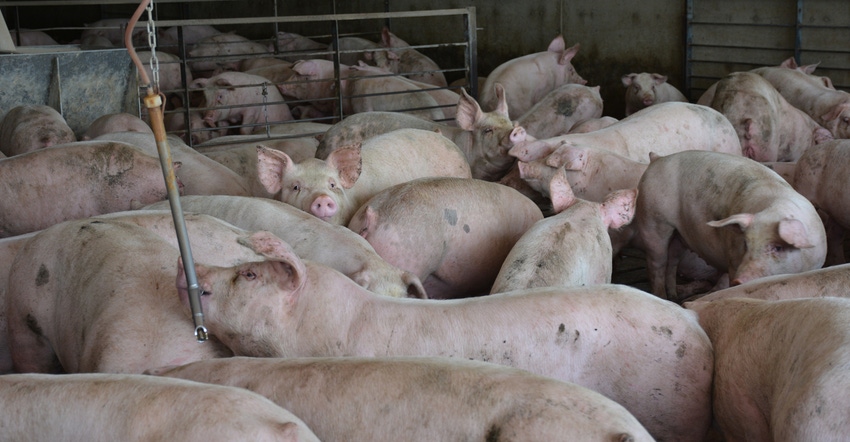August 17, 2021

African swine fever continues to spread across the globe, creeping closer to U.S. soil and our swine herds.
When ASF was reported in China in late-summer 2018, all eyes of the U.S. swine industry were closely focused on the other side of the world as the disease that only infects hogs continued its spread across Asia and Europe. The U.S. swine industry and USDA were stepping up efforts to keep ASF and all foreign animal diseases at bay.
All efforts appear to be working, from the Beagle Brigade sniffing out illegal pork products at ports and airports to reinforcing biosecurity measures across the board.
ASF has yet to reach the U.S. swine herd, but it is getting closer. In late July, positive hog herd cases were reported in the Dominican Republic, the first time in about 40 years that the disease has been detected in the Americas. According to a report from the Swine Health Information Center, with the discovery of the disease in the Dominican Republic, ASF is now found on five continents.
SHIC and the University of Minnesota presented a report that states the ag ministry of the Dominican Republic on July 28 confirmed the presence of ASF after learning the results of tests on 389 samples collected from pigs raised on farms and in backyards.
Five days later, per the SHIC-UMN report, the Dominican Republic’s government reported ASF detection in 11 of the country’s provinces. The first positive samples were from a backyard herd in the Sanchez Ramirez province, where the herd was swill-fed.
Though Dominican hog production pales in comparison to that of the United States, it only takes one infected hog or one infected pork product to snowball into a large outbreak. According to USDA, pork and pork products from the Dominican Republic are currently prohibited entry to the United States as a result of existing classical swine fever restrictions.
Then again, exceeding the legal speed limit is prohibited, but everyday people break that law.
USDA is committed to assisting the Dominican Republic in dealing with ASF, is offering continued testing support, and will consult with the nation on additional steps or actions to support response and mitigation measures. USDA says it will also offer similar help to Haiti, which borders the Dominican Republic and is at high risk for ASF.
Damage to Dominican herd
According to a Bloomberg article, more than 500,000 pigs, about half of the Dominican Republic herd, were potentially going to be slaughtered to curb the outbreak.
The Bloomberg article goes onto say “the government needs to kill 100% of both sick and healthy pigs in 11 of the Dominican Republic’s 33 provinces where the disease has been detected.
“If it fails to do this, the highly contagious disease will likely cause a repeat of the 1978 outbreak, in which the country’s entire pig population had to be slaughtered, he said in a phone interview.
“Those 11 provinces — including the capital, Santo Domingo — are home to about 50% to 60% of the country’s 1.35 million pigs, according to the Dominican Pig Farming Federation.”
The USDA continues to work diligently with partners including the U.S. Customs and Border Protection and the U.S. swine industry to prevent ASF from entering the United States.
In addition to the aforementioned illegal pork products traveling with tourists, the USDA’s Animal and Plant Health Inspection Service issued a federal order in early August establishing additional requirements that take effect immediately for dogs imported into the United States for resale from countries where ASF exists. According to an APHIS press release, the number of dogs being imported for resale from ASF-affected countries is growing, and APHIS is taking this action to continue its efforts to protect the U.S. swine industry.
The National Pork Producers Council applauds this action, after earlier this year raising the awareness of the potential risk for imported rescue dogs to serve as disease carriers from their bedding, crates or coats. Though adopting a rescue dog is honorable, it is not worth putting an entire industry at risk.
“Each year, several thousand dogs enter the country for resale or adoption. If even one of these animals carried ASF into the country, it could put the U.S. swine herd and other livestock in jeopardy and have disastrous consequences for our nation’s agriculture sector,” NPPC Chief Veterinarian Liz Wagstrom says in an NPPC press release.
Even though ASF is not a threat to human health, cannot be transmitted from pigs to humans and is not a food safety issue, it is still imperative that it does not get any closer to the U.S. swine herd. That is a task that is on the shoulders of hog producers and the general public to step up biosecurity measures, learn more about ASF and all foreign animal diseases, and then spread the word on what your friends and neighbors can do to prevent ASF from reaching U.S. hogs, and stop the spread if it does get here.
Read more about:
African Swine FeverYou May Also Like




